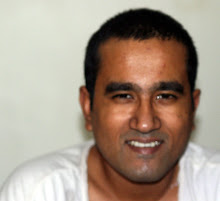 brigands around the corner, the snows plotting an avalanche, the wild stripes of the tiger, the last drop of water - have sired a legacy of winding queues at check-in counters where the only niggling uncertainties concern delayed flights and the availability of aisle seats. A million vacations roll by every year, on the red carpets of air-conditioned transfers and luxury suites, unsullied by the touch of the earth; too stoned from adrenalin trips - bungee-jumps and para-glides - to be able to smell the heady fragrance of the wet soil - drenched by tears of joy and sorrow pouring forth from the clouded layers of history…
brigands around the corner, the snows plotting an avalanche, the wild stripes of the tiger, the last drop of water - have sired a legacy of winding queues at check-in counters where the only niggling uncertainties concern delayed flights and the availability of aisle seats. A million vacations roll by every year, on the red carpets of air-conditioned transfers and luxury suites, unsullied by the touch of the earth; too stoned from adrenalin trips - bungee-jumps and para-glides - to be able to smell the heady fragrance of the wet soil - drenched by tears of joy and sorrow pouring forth from the clouded layers of history…Sir Vidia, with his acid tongue and boundless cynicism, doesn’t exactly answer to the description of a seeker. But notwithstanding his conservative tweed jacket and the rakish pipe sticking out of his mouth, he comes close to discovering what has eluded generations of loin-clothed Hare Krishnas and hippies, hoping for a hashish-enabled enlightenment on the banks of the Ganges – the spirit of a land.
Beyond Belief is a continuation of Naipaul’s travels in Islamic countries, a journey that began in 1981 with “Among the Believers”. The focus of the sequel, published in 1999, is on “excursions among the converted people” – or civilizations that have found themselves eroded, and partially erased, by the Arabism that, in the opinion of the author, comes ineluctably bundled with Islam. The cultures that come under the scanner as a result of this purported assault include Persia, Pakistan and the East Indies.
Naipaul’s investigation principally relies on an oft-mentioned diary that weaves together countless strands of random thought, patiently drawn out by the author from minds that do not always share his enthusiasm for clarity, detail and honesty. His language is decidedly more sophisticated than his deductive technique but the frequency of phrases like “The moment had passed” betrays the author’s preference for concentrating his attentions on the complexity of his subject rather than on demonstrations of literary prowess. The grounded-ness is also reflected in the nature of his inquiries – the hard evidence of history, politics and economics is brought to bear upon any inclination towards mystical flights of fancy. Conclusions are gleaned from the grime on the worker’s face, the furrows on the farmer’s brow and the blood in the soldier’s eyes. These islanded tales of humdrum contentment, frustrated indifference and cataclysmic devastation are fused, brilliantly, to shape magnificent continents – alive with rivers of blood streaming down the ages, forbidding forests of fear and horror, deserts of unrealized aspirations and towering mountains of hope.
One is unable to agree with Naipaul’s central thesis. It is difficult to argue, for instance, that Islam transformed Malaysia or Indonesia any more than the waves of Hinduism and Buddhism had done previously. Indeed, while traces of pre-Islamic culture are more than evident in these countries, none whatsoever remains of anything that might have preceded the Indic religions. The conflicts and contradictions that the author rants about are at best an illustration of a general principle that the psyche of a subjected culture inevitably suffers from a schizophrenic fracture, often resulting in a dichotomous ambivalence towards the past. This is no less true of Aryan India or Western Christendom than of Islamic Persia or Pakistan.
However, while Naipaul’s conclusions appear colored by his well-documented prejudices, they leave untouched, his extraordinarily perspicacious insights into the tormented, confounded civilizations he examines. No painstakingly filmed documentary, no detailed travelogue, no exhibition of photographs, not even an actual visit can match the unforgiving clarity of the mirror he holds up to his subjects’ souls.
The traveler has been rescued from extinction.

No comments:
Post a Comment